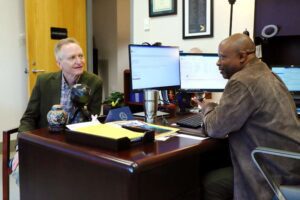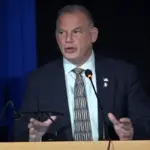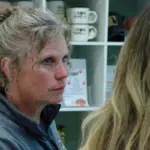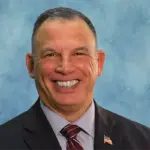Gary Honeman and Clyde Johnson (above)
Carroll Citizens for Racial Equity Support the Truly ‘American family’
by Amanda Milewski, photography by Nikola Tzenov
I see what’s possible when we recognize that we are one American family, all deserving of equal treatment,” said former President Barack Obama.
Likewise, members of Carroll Citizens for Racial Equity (CCRE) see that similar possibility right here in Carroll County. They have been working hard for the last 30 years to bring awareness to the issue of racial equity in the county.
CCRE is a community-driven, volunteer organization that works to increase awareness, educate residents, and sponsor educational opportunities to enhance the county’s integration of race, culture and faith.
Bridging the gaps
During its three decades, CCRE has promoted its mission through a number of initiatives, including their annual Bridging the Gap conference, which brings together community members and counseling professionals to discuss issues related to racial equity. The conference is open to the public and will be held on June 9 at Carroll Community College.
CCRE also provides consultation and training upon request; collaborates with other public and private diversity and racial justice allies; has a partnership with Kids for Equity, a student-sponsored advocacy group based at Westminster High School; and maintains alliances with McDaniel and Carroll Community colleges.
“For many years, we were a small group of volunteers,” said Gary Honeman, CCRE co-founder and chairperson, “and anyone who wanted to jump on board was welcome.” Although they wouldn’t be where they are today without those volunteers in the early days, they are now more deliberate in who they recruit to help lead CCRE on the steering-committee level.
“Now, when you look at our steering committee,” Honeman affirmed, “it’s composed of people representing probably 15 to 17 pretty significant community organizations. All of those organizations are sanctioning one of their employees to be associated with a racial equity group that consults, trains and holds an annual conference.” Steering committee members also are furthering CCRE’s mission back in their own organizations, the importance of which can’t be understated.
Those early days also included bridging the gap in the Carroll County Public School (CCPS) system, Honeman explained. “Back in those days, there were no minority achievement initiatives. They didn’t have anyone on staff addressing those issues, so we were kind of filling a gap for probably the first 10 years of CCRE’s existence. After we saw that CCPS was moving in the right direction and securing positions for employees to address these issues, it allowed us to grow into community-based work.”
Honeman also recounted that in their work with CCPS, they established leadership conferences beginning with high school students and eventually growing to include students at the middle school level. CCRE was in the forefront of diversity training in public education in the county, which laid a firm foundation for the organization’s transition to offering training for adults through their annual conference.
Tackling hard issues
The Bridging the Gap conference, which began in 2012, brings together community members and professionals in the fields of counseling and social work to explore and learn about current issues related to race and equity that are being faced both in the county and the country as a whole.
This year’s conference is the first in-person event since the COVID-19 pandemic, although a number of conference presentations and sessions will still be available virtually. It is also the first time the conference will be hosted by Carroll Community College.
Bridging the Gap will include opening remarks by Honeman and Clyde Johnson, CCRE co-chair, and a keynote address titled “Social Change, Relationship, Thinking and Practicing Small,” by Erin Watley, associate professor of communication at McDaniel College and owner of Intersect Consulting.
Following the keynote address, participants will attend break-out discussions where they engage in meaningful dialogue and practice some of the concepts and methods presented.

The afternoon features presentations by local entertainer Billy Lyle, Kids for Equity, and motivational speaker Jordan Davis, who is a McDaniel College and Georgetown University graduate.
The conference registration is a bargain at $15, especially when compared to other conferences that offer continuing education units (CEUs). Bridging the Gap offers six CEUs for social workers and professional counselors.
Kim Rhoton, a licensed social worker and psychotherapist with a private practice in Westminster, has attended Bridging the Gap for the last several years.
“This conference is always informative,” Rhoton said. “There is always ample time to divide into smaller groups and to engage in meaningful discussions with other conference attendees.”
Rhoton acknowledged that the conference’s subject matter can be difficult to address. “Discussions about race can be challenging and uncomfortable at times,” she noted. “It can create some defensiveness and strong emotional reactions.
“I personally think it is beneficial to ‘lean in’ to things that are challenging, as this is where change can occur. As a social worker, my focus is not just on the individual well-being of my clients but also on the well-being of our community as a whole. And genuinely, I think we all have to take a seat at the metaphysical table and listen to the experiences of others. Listening with empathy and seeking to better understand the experiences of others gives us the greatest chance to learn and grow.”
Honeman explained that the importance of a conference like Bridging the Gap is that it provides social workers and counselors who work with individual families and groups in a therapeutic setting with the knowledge and skill to deliver services in a culturally competent way.
He remarked that gaining that awareness can help employees view broad institutional foundations like the composition of the staff or a strategic plan, for instance, with a critical eye toward racial equity.
Open yourself to conversations
CCRE co-chair Johnson hones his awareness and critical eye in his position as executive director for diversity, equity, and inclusion (DEI) at Carroll Community College. He is the first person to serve in that position.
His involvement with CCRE began in 2021, “instantly upon my arrival at Carroll Community College,” he recalled. “Since the mission of CCRE was so interchangeable with some of the goals the community college espoused in their development of the DEI position, it was logical to not only provide support from the college but also to become a member and help on the CCRE’s steering committee.”
Johnson will take the helm as chair on July 1, when Honeman’s term ends. Johnson has focused on learning about the work CCRE has been doing in the county for the past 30 years and understanding its goals, shadowing Honeman, and absorbing the county’s history from Virginia Harrison, CCRE co-founder.
Johnson’s priorities as incoming chair are “to support the membership in addressing DEI issues in more creative ways, support more partnerships with agencies and coalescing strategies to amplify educating communities on the negative impacts of racism, sexism, poverty, and the things that are detrimental to a communities’ growth.”
He also hopes to further strengthen CCRE’s relationships with McDaniel College and Carroll County Public Schools. He affirmed that CCRE’s current partnership with Carroll Community College in hosting the Bridging the Gap conference is something they worked diligently to achieve. “This partnership allows the CCRE to continue being the brainchild and developing content, while Carroll Community College’s Continuing Education and Training (CET) division does all of the organizing, managing, and implementing the conference. Partnering with the CET at Carroll Community also allows the college to fulfill one of its missions — building community and educating a larger segment of the community, not just enrolled students.”
Johnson encourages members of the community to attend the Bridging the Gap Conference to learn more about CCRE and the work it supports. “Open yourself to the training and conversations,” he urged. “I think most of all, finding the courage within to understand that diversity, equity, and inclusion efforts do not take away from majority communities. Rather, when we do the work well, when we integrate these thoughts and concepts within community, we facilitate intellectual and cultural growth across all people.”
He also hopes that “if we could do one major thing in the next few years, it would be to help navigate open and honest conversations here in the county, where we can ‘hear’ each other’s thoughts as this entire country grapples with America’s toughest subject — diversity. Some have taken this word and weaponized it.”
Rhoton has a similar hope. “It is my sincere wish that we can continue to strengthen a community in which everyone feels heard, feels safe and feels welcome.”
Thanks to CCRE, those conversations that started 30 years ago continue to benefit Carroll County today.
Learn more: CarrollCitizensForRacialEquity.org













